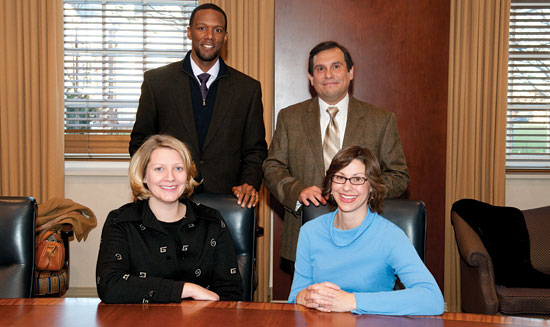
By artika rangan Office of Communications & Marketing

National headlines tell the story in bold-faced type: "Anger and anxiety fuel high election stakes." "Frustration and fear among voters as election nears." "Anger, close races spur higher Tuesday turnout than for midterm."
There is no doubt that emotions are deeply entrenched in politics — even the 2008 presidential election was largely won on a campaign of hope and change — but to what extent do emotional appeals by candidates lead people to engage in politics?
To answer that question, researchers at the University of Delaware looked to the Internet, a medium some scholars claim is an ideal channel to mobilize and engage, and uncovered rather surprising results.
"The conventional wisdom says the ill-informed would be easily swayed by emotional appeals, but that wasn't the case," says Lindsay Hoffman, an assistant pro-fessor with joint appointments in the Department of Communication and the Department of Political Science and International Relations.
Hoffman, a principal investigator on the study, whose research examines the political uses of new technology, teamed up with co-principal investigator and political science professor Philip Jones, as well as political science professors Julio Carrión and David Wilson (a former consultant for Gallup) and communication professor Dannagal Goldthwaite Young to conduct a national online survey of 1,000 respondents.
Funded by the Interdisciplinary Humanities Research Center and the Center for Political Communication, the team created a website for a fictitious political candidate, who either expressed anger, hope or anxiety about the economy, or displayed no emotional plea whatsoever. Respondents then indicated how likely they were to participate on his behalf.
"Contrary to popular belief, it was the most engaged and politically sophisticated voters whose decisions were swayed by emotional appeals, not the politically apathetic ones," says Hoffman. "We believe this is because the most engaged citizens use emotion as an informational cue, so that in the absence of other information (like the candidate's party or ideology), emotion serves as an important signal to action."
The second aspect of their research assessed political participation and communication on a variety of Internet tools, including social media.
They found that Republicans were more active than both Democrats and Independents in behaviors such as signing online petitions, communicating with others online, signing up for news updates and contributing money. Independents, however, were more likely than Democrats and Republicans to post comments or questions, "friend" or "like" a candidate's Facebook page, start or join an online group, or submit information to media. Yet even the most frequently reported activity — signing an online petition—was only cited by 18 percent of respondents.
"People aren't terribly politically active online," Hoffman explains. "The ones who are most engaged offline are doing the most online, too."
Although candidates may not gain an entirely new constituency through new technology like social networking sites, the role, prevalence and importance of such sites must not be underestimated, she adds. Hoffman points to Sarah Palin's widely reported tweets or the infamous Weinergate as examples of how social media pervade traditional media, and she expects social media to play an integral role in the 2012 elections.
"These websites allow candidates to connect with their supporters in a way they never could before," she says. "Politicians have to be well-versed in their use because technology is altering the landscape of political campaigns."
Hoffman is extending the findings from this study to examine how Delawareans utilize technology for political purposes. Her ultimate goal, she says, is to understand the broader, normative implications of technology's role in politics.
"How are we using technology? Is it good? Is it making us better citizens?" she asks. "Or is it making us more polarized? Does it enable us to become more sealed off, surrounded by likeminded ideologues?
"There is so much that is still unknown," she notes, "and what makes this research exciting is that media technologies and how citizens use them are constantly evolving." — Artika Rangan